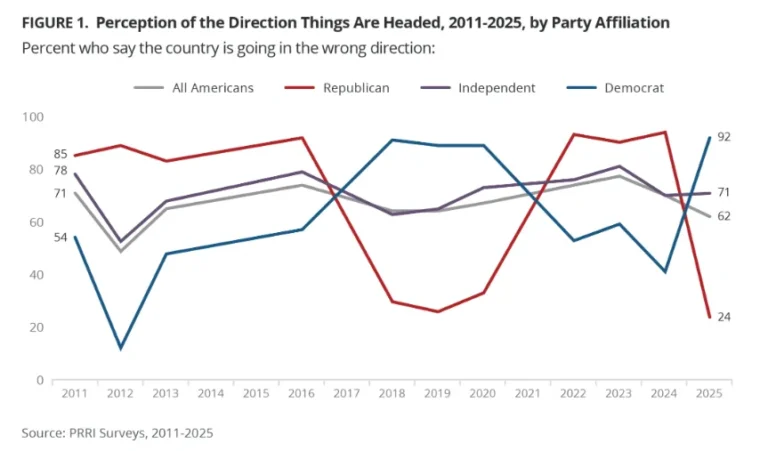
This article was originally published on Andrew Whitehead’s Substack, American Idolatry.
The 16th annual American Values Survey (AVS) from PRRI just dropped and it is well worth your time. I always look forward to the AVS as it provides a really in-depth snapshot of where we are and how our fellow Americans see the world around them in the moment.
The executive summary shows that one of the main takeaways of the report and survey is many Americans are pessimistic of where things are right now—but those attitudes really depend upon our political views. Democrats, and to a lesser extent Independents, are quite critical of the current state of affairs, with Republicans being substantially more supportive of where we find ourselves.
This, of course, has to do with which party sits in the Oval Office, as the figure below clearly demonstrates. In 2024, when Biden was president, 94% of Republicans said the country was going in the wrong direction. Today, only 24% of Republicans say the same.
But underneath that partisan divide, we find American religion. While not the whole story, it does bring a lot of things into greater focus. I’d like to highlight a couple of those findings in the hopes you’ll click the link above and check out the full report. I can’t stress enough how important non-partisan research firms like PRRI are in this moment of mis- and disinformation. We need to embrace empirical evidence!
White Christian groups have the highest levels of approval of Trump’s second term as president. White evangelicals (76%) are clearly thrilled, with slim majorities of white mainline and white Catholics approving of Trump.
Turning to Christian nationalism, we can see that Americans who are at least sympathetic to it are clearly most approving of Trump (67% and 77%), while Skeptics of Christian nationalism (42%) and Rejecters (9%) are less so. The Skeptics number is surprising to me—it clearly departs from both the Sympathizer/Adherent groups as well as the Rejecter group. I would love to see deeper analysis on what it is that Trump is doing that appeals to Skeptics to set them apart from Rejecters. When it comes to Trump, these two groups are usually much closer in agreement.
While the data visualization is just a bit confusing, PRRI asked folks to agree or strongly agree with one of two statements—Is Trump a dangerous dictator or a strong leader? Most Americans see him as a potentially dangerous dictator.
But Hispanic Protestants, and especially white Christians, are more likely to see him as a strong leader who needs power in order to restore America’s greatness.
Here again, Christian nationalism is closely aligned with support for Trump. Majorities of both Rejecters and Skeptics see Trump as a potentially dangerous dictator. Sympathizers and Adherents see him as a strong leader.
Part of the story of how Americans view Trump and his administration is if America’s system of checks and balances (primarily through separating powers across three branches of government—legislative, executive, and judicial) is holding. Americans are divided about whether “the system of checks and balances in our government is working as it should to limit one branch of the government from becoming too powerful” (46% agree vs. 50% disagree).
Looking at the Supreme Court specifically, we see a slim majority of Americans agree SCOTUS has been too willing to let Trump expand his power. And yet again, Hispanic Protestants and white Christians (evangelical, Catholic, mainline) are mostly aligned in that they do not believe SCOTUS has given Trump too much power.
One of the most alarming findings of the past few PRRI surveys has been a growing, but still minority, level of support for political violence. In the current survey they actually find the level of support for political violence has declined from its high in 2023, where just over 23% said true patriots may have to resort to violence to put our country back on track.
Now, only 17% of Americans agree with this statement. But 33% of Adherents of Christian nationalism agree, and 25% of Sympathizers agree. As I write in American Idolatry, violence is a central idol of Christian nationalism and is a natural result of a quest for self-interested power and embracing fear that “they” are trying to steal that power away.
There is one final set of findings I’d like to highlight before you go check out the full report. I think it is good news that nearly two-thirds of Americans (64%) would prefer “the U.S. to be a nation made up of people belonging to a wide variety of religions,” compared with 32% who prefer “the U.S. to be a nation primarily made up of people who follow the Christian faith.”
White evangelicals and Hispanic Protestants are the only religious groups where a majority say they’d rather have a country where most people follow the Christian faith. The fact that Hispanic Protestants score so high here is evidence that embracing this religious identity is linked to demonstrating their “American-ness.” My guess is that quite a few Hispanic Protestants are Adherents of Christian nationalism, and as we can see at the bottom of the figure, a vast majority of those folks want a nation full of Christians. So while their race/ethnicity might be seen as a mark against their “American-ness,” Hispanic Protestants embrace Christian nationalism in order to show they are truly American.
Be sure to check out the full PRRI report and sign up for PRRI’s newsletters so you stay up-to-date on all of their reports as they are released. I’m proud to work with PRRI as a former board member and a current senior democracy fellow, and can attest to their commitment to bringing high quality religion data to the broader public in order to inform and support a strong civil society.